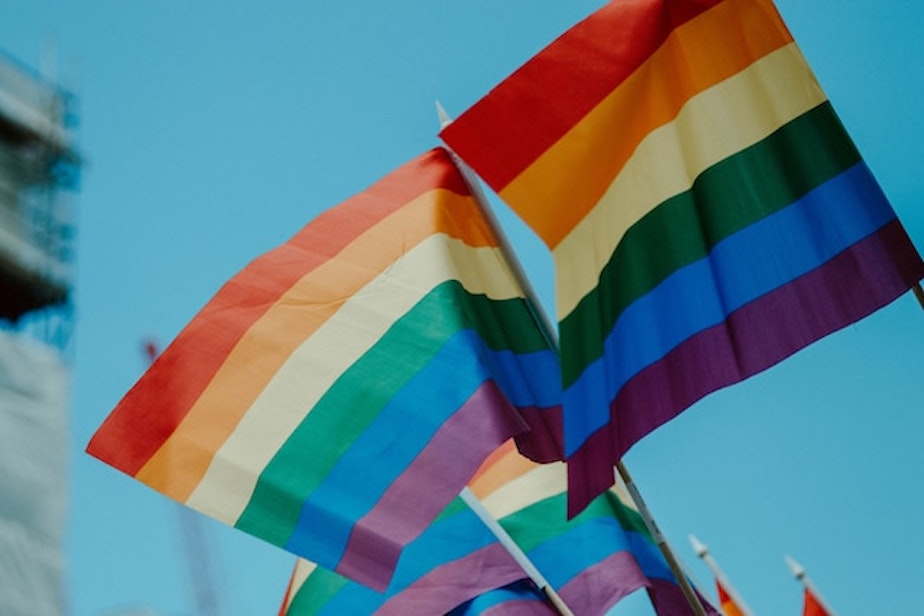This Seattle author wrote a memoir for LGBTQ youth. Now it's being banned

Hundreds of books have been challenged in 2023, including numerous LGBTQ titles.
About 26% of titles banned in 2023 have LGBTQ characters or themes, according to PEN America, a free speech organization that tracks such challenges.
Seattle author Shaun David Hutchinson's memoir "Brave Face" has been among them.
It's a vulnerable look at Hutchinson's experience growing up queer at a time when he had few resources to turn to for support.
"I had been unable to find the resources that I needed to understand and come to terms with what was going on with me, to understand what being gay meant," he said.
"Brave Face" was published in 2019, well into Hutchinson's adulthood and time as a Seattle resident. Then, in 2020, he first learned his book "We Are The Ants" was being banned, then "Brave Face" followed. To add salt to the wound, it all started in his home state of Florida.
Sponsored
"It is not the same place it was when I was growing up," Hutchinson said of Florida, which has been front and center in the battle over books, in part, because of its Republican governor and 2024 presidential candidate, Ron DeSantis.
Books like Hutchinson's and Maia Kobabe's "Gender Queer" have broadly — and falsely — been accused of being used to "groom" children for sexual exploitation. "Gender Queer" was the most banned book in the U.S. at the start of the 2022-23 school year, just as it was during the 2021-22 school year, according to the PEN America Index of School Book Bans. Also a memoir, "Gender Queer" explores what it means to be gender nonbinary and the journey Kobabe took to reach that identity.
Without access to books like theirs, Hutchinson said he worries about the obstacles queer kids today will face, obstacles he once went through in the '90s but thought would be left in the past by the generations that followed.
"I wanted to write ["Brave Face"], so that this book existed, that didn't exist when I was that age," Hutchinson said. "And now, to have parents and adults who don't even have kids that go to some of these schools, coming along and they call it child pornography. Calling me a groomer. Calling me a f—. ... It breaks my heart."
Sponsored
Watching his books and others in the LGBTQ category — a label he has mixed feelings about, by the way — has left Hutchinson feeling helpless. His way of helping young queer people was to write "Brave Face." What can he do when that tool is no longer readily available to everyone who may need it?
"There's just not a whole lot that individual authors can really do in these situations," he said. "It makes me really sad to sort of see that the last, whatever, 13 years of my life, writing books for queer youth is sort of being dismantled by people who don't understand what they're doing."
Hutchinson, like many other authors whose works are being challenged and banned, has not had the opportunity to defend his writing.
Seattle author Kirby Larson shared a similar story about learning that her historical fiction novel "Dash" was being banned in Florida, too. She spoke to KUOW as part of Banned Books Week. Larson was never directly contacted about the challenge nor was she told why the novel about Japanese-American incarceration during World War II was unfit for fifth graders.
Sponsored
What worries Hutchinson most is the unseen harm banning books can do.
"We see the banned books, you know, the books on the list," he said. "What we don't see, and what's really hard to get numbers on, is how many books are just never making it into schools, because librarians are terrified of losing their jobs, of violence against them.... And kids are going to lose a lot of opportunities to find these books."
Many of the battles over books are being fought in places outside of Washington state. Most have been concentrated this year in Florida, Missouri, South Carolina, Texas, and Utah, according to PEN America.
But the fight has taken shape in other ways here in Washington state.
Columbia County's only library might have been the first in the nation to shutter over content challenges were it not for a court ruling in its favor.
Sponsored
More than a year ago, challenges started rolling in from people claiming books in the children’s and young adult sections of the library were “graphic” or “obscene.” When those books weren’t banned, they petitioned to dissolve the Columbia County Rural Library District.
The measure to dissolve the small library was struck down in Columbia County’s Superior Court. Commissioner Julie Karl ruled in favor of not allowing it on the November ballot, finding that the library provides critical services to the county that would disproportionately affect the poorest members of the community.
“This court is cognizant of the impact of this decision on all concerned and its reach beyond the borders of this city, county or even this state,” Karl said to the packed courthouse as the ruling was handed down in September.
That case may not be over, though. In a public post to Facebook, Jessica Ruffcorn, who helped lead the ballot measure effort, said the community had been activated and would continue to fight to "protect the children."
In the meantime, authors like Hutchinson look on and hope kids will have more — not less — access to stories of all kinds.




